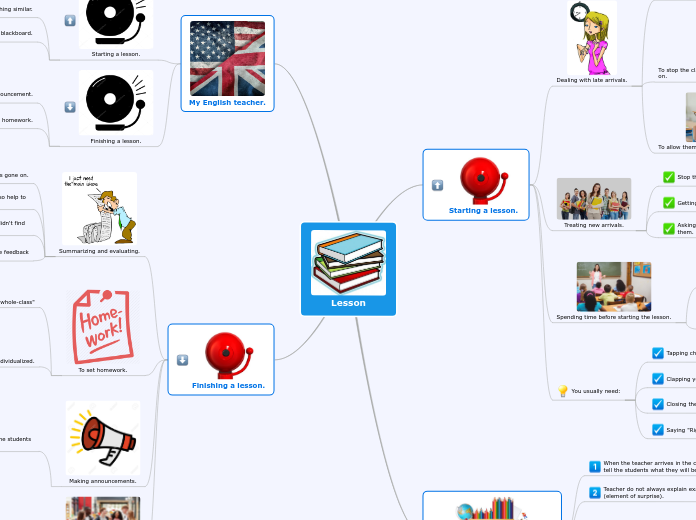
Lesson

Starting a lesson.

Dealing with late arrivals.

To exclude them.

To stop the class and explain to the latecomer what is going on.

To allow them to creep in and sit down quietly.

Treating new arrivals.
Stop the class and gently
Getting the others to introduce themselves.
Asking a few formal questions to find out something about them.

Spending time before starting the lesson.
Socialize.
To talk the students individually.
Let them get to know you.
Give back homework.
You usually need:
Tapping chalk or a pen on the desk audibly.
Clapping your hands loud and clear.
Closing the door.
Saying "Right", "OK" or something similar.

Marking the stages of a lesson.
When the teacher arrives in the classroom he or she needs to tell the students what they will be doing.
Teacher do not always explain exactly what they going to do (element of surprise).
When an activity has finished and/or another is about to start, teachers need to re-focus the students' attention.
Examples:
"Thank you... now can I have your attentio please?"
"OK, thanks... let's all face the front shall we?"
The teacher to raise his o her hand.
When an activity or a lesson has finished, it helps if the teacher is able to provide some kind of closure.

My English teacher.
Starting a lesson.
He say "OK", "right or something similar.
He writes on the blackboard.
Finishing a lesson.
He makes an announcement.
He sets homework.

Finishing a lesson.

Summarizing and evaluating.
Some lessons need a brief summary of what has gone on.
Telling the students what'll happen next time may also help to motivate them to return.
Asking them what they found useful and what they didn't find useful not only fills gaps.
To provide feedback
To set homework.
For "whole-class"
Make sure you have all the students' attention when setting it.
Clearly set the task, perhaps give an exampl, or start in on the board.
For individualized.
Make sure the task is appropiate to the individual, that there is time for him to complete it, and you follow it up.
Allow time either before the lesson or during a break, or after the lesson, to set it.

Making announcements.
Give them clearly and understandably and check the students have understood.

Farewells and socializing.
Make sure you say goodbay naturally.
